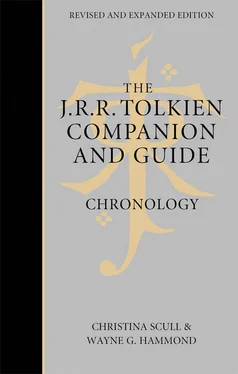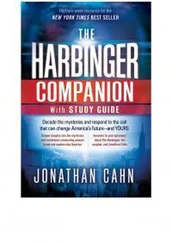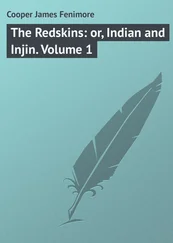11 November 1914Tolkien again borrows A Finnish Grammar by C.N.E. Eliot from the Exeter College library, presumably in conjunction with the essay he will read on 22 November, or with his work on The Story of Kullervo .
Before 15 November 1914Tolkien writes to Wiseman, commenting on the power of the T.C.B.S. to shake the world.
15 November 1914Wiseman writes to Tolkien, expressing a fear that the members of the T.C.B.S. – some now at Oxford, some at Cambridge – have been growing apart and no longer have the same interests. Nevertheless he does not think that either institution ‘can really have destroyed what made you and me the Twin Brethren in the good old school days before there was a T.C.B.S. apart from us and V[incent] T[rought].’ He is unhappy, but not judgemental, that Tolkien still has not told his friends the name of his fiancée.
16 November 1914Tolkien writes an eight-page letter to Wiseman. He has read parts of a letter from Wiseman to Smith, and makes it clear that he too considers the friendship between himself and Wiseman to be ‘the great twin brotherhood … the vitality and fount of energy from which the T.C.B.S. derived its origin.’ He thinks that Wiseman’s feeling of growing apart has arisen partly because the four members have not been able to meet without other, less sympathetic people present, but also because he and Wiseman (unlike Gilson and Smith) have always discussed more fundamental matters with each other, and for both of them religion is at once their moving force and their foundation. He suggests that they discuss what unifies them, what is of supreme importance to them, and what are ‘allowable’ differences. For himself, religion, human love, the duty of patriotism, and a fierce belief in nationalism are of vital importance. He is ‘not of course a militarist, and ‘more & more [a] convinced Home Ruler’ (Tolkien Papers, Bodleian Library, Oxford). Some old college friends may be coming up next weekend, but he does want to see Wiseman, so the latter should come to Oxford when he can. – Also on this date, Wiseman writes again to say that Rob Gilson can attend a T.C.B.S. meeting on 12 December. He thinks that Gilson disagrees with Tolkien about the world-shaking power of the T.C.B.S., a point which should be fought out when they meet on the 12th.
17 November 1914At a meeting of the Stapeldon Society Tolkien takes part in a debate, on the motion: ‘This House disapproves of a system of stringent economy in the present crisis.’ The motion carries, 11 to 5. The Society minutes do not record on which side of the issue Tolkien spoke.
22 November 1914Tolkien reads an essay, On ‘The Kalevala’ or Land of Heroes , to a meeting of the Sundial Society at Corpus Christi College, in Mr Water’s rooms. When he first came upon the Kalevala , he said, he ‘crossed the gulf between the Indo-European-speaking peoples of Europe into the smaller realm of those who cling in quiet corners to the forgotten tongues and memories of an elder day’. The ‘mythological ballads’ that comprise the Kalevala ‘are full of that very primitive undergrowth that the literature of Europe has on the whole been cutting away and reducing for centuries with different and earlier completeness in different peoples’ (Tolkien Papers, Bodleian Library, Oxford). See note . At the same meeting, G.B. Smith is elected president of the society for the coming term.
24 November 1914The Stapeldon Society meets.
27 November 1914Tolkien works in the morning, drills and attends a lecture in the afternoon, has dinner with T.W. Earp (then Secretary of the Exeter College Essay Club), and attends a meeting of the Essay Club in Mr Bedwell’s rooms. At the latter the Reverend G.H. Fendick reads a paper on T.E. Brown, reviewing his activities as a schoolmaster and poet; a keen discussion follows. Several members then read poems they themselves have written; Tolkien reads his Voyage of Éarendel . Later that evening, Tolkien writes to Edith, describing his day. The Essay Club meeting was ‘an informal kind of last gasp’ (the Club has been meeting only intermittently, due to the war). He found the Essay Club paper ‘bad’ but the discussion interesting. ‘It was also composition meeting and I read “Earendel” which was well criticised’ ( Letters , p. 8). – Probably inspired by his visit to Cornwall in August, Tolkien begins to rewrite and greatly extend his poem The Grimness of the Sea (first composed in 1912).
28 November 1914Rob Gilson joins the Cambridgeshire (11th) Battalion, Suffolk Regiment as a second lieutenant.
?Late 1914Tolkien writes in his St John Street rooms a long poem concerning Eärendel (now so spelt), in which Eärendel is a mariner who wanders earthly seas, a figure of ancient lore whose tales are bound up with those of the fairies (or Elves, as the poem will be later emended). On the back of one of the earliest workings of the poem is an outline of a great voyage by Eärendel to all points of the compass on earth, but also to ‘a golden city’ later identified as the Elvish city Kôr, before setting sail in the sky as in The Voyage of Éarendel the Evening Star . Tolkien’s mythology is rapidly developing in his imagination, becoming broad and deep and taking on enduring features. Later he will divide the first part of the long poem, * The Bidding of the Minstrel , from its second part, to be entitled The Mermaid’s Flute . – Emily Jane Suffield, Tolkien’s maternal grandmother, dies.
Late 1914Tolkien begins to create, or continues to work on, his ‘nonsense fairy language’ (Qenya), as he will later refer to it (letter to Edith Bratt, 2 March 1916, Letters , p. 8).
December 1914Tolkien rewrites his poem Outside (first composed in December 1913). – The Stapeldon Magazine for December 1914 comments on changes the war has brought to Oxford. Bugles are heard in the morning; many undergraduates wear uniform to lectures; colleges have been partly taken over as barracks; many rooms are empty since their occupants have enlisted; the Parks are full of troops drilling, and there are convalescent soldiers and Belgian refugees in the streets. All who able to do so have joined the Officers Training Corps. Regular or organized games are impossible. ‘All other games have been neglected in preparation for the “Greater Game”’ (p. 104). – G.B. Smith joins the Oxfordshire and Buckinghamshire Light Infantry.
2 December 1914The Stapeldon Society meets.
4 December 1914Tolkien continues to rewrite his poem The Grimness of the Sea , now giving it a new title, The Tides . He inscribes the current manuscript ‘On the Cornish Coast’.
5 December 1914Michaelmas Full Term ends.
12–13 December 1914Tolkien attends a T.C.B.S. meeting or ‘council’ at the Wiseman family home in London. The friends know that they will soon be involved in the war and want to regain their former closeness. They spend much of the weekend sitting around a gas fire, smoking and talking. They all have ambitions in literature, art, or music, and feel that they gain inspiration from each other. Tolkien will later refer to the ‘hope and ambitions … that first became conscious at the Council of London. That Council was … followed in my own case with my finding a voice for all kind of pent up things and a tremendous opening up of everything for me: – I have always laid that to the credit of the inspiration that even a few hours with the four always brought to us’ (letter to G.B. Smith, 12 August 1916, Letters , p. 10).
Читать дальше












